English Legal System Project
VerifiedAdded on 2020/07/22
|13
|3616
|45
AI Summary
The project is a comprehensive study of the English legal system, highlighting its major sources as common law and some legislation. It examines how these laws influence business operations, employment contracts, and employer-employee relationships. The report also delves into dispute resolution mechanisms, such as arbitration, negotiation, and mediation, suggesting their consideration in resolving business issues.
Contribute Materials
Your contribution can guide someone’s learning journey. Share your
documents today.
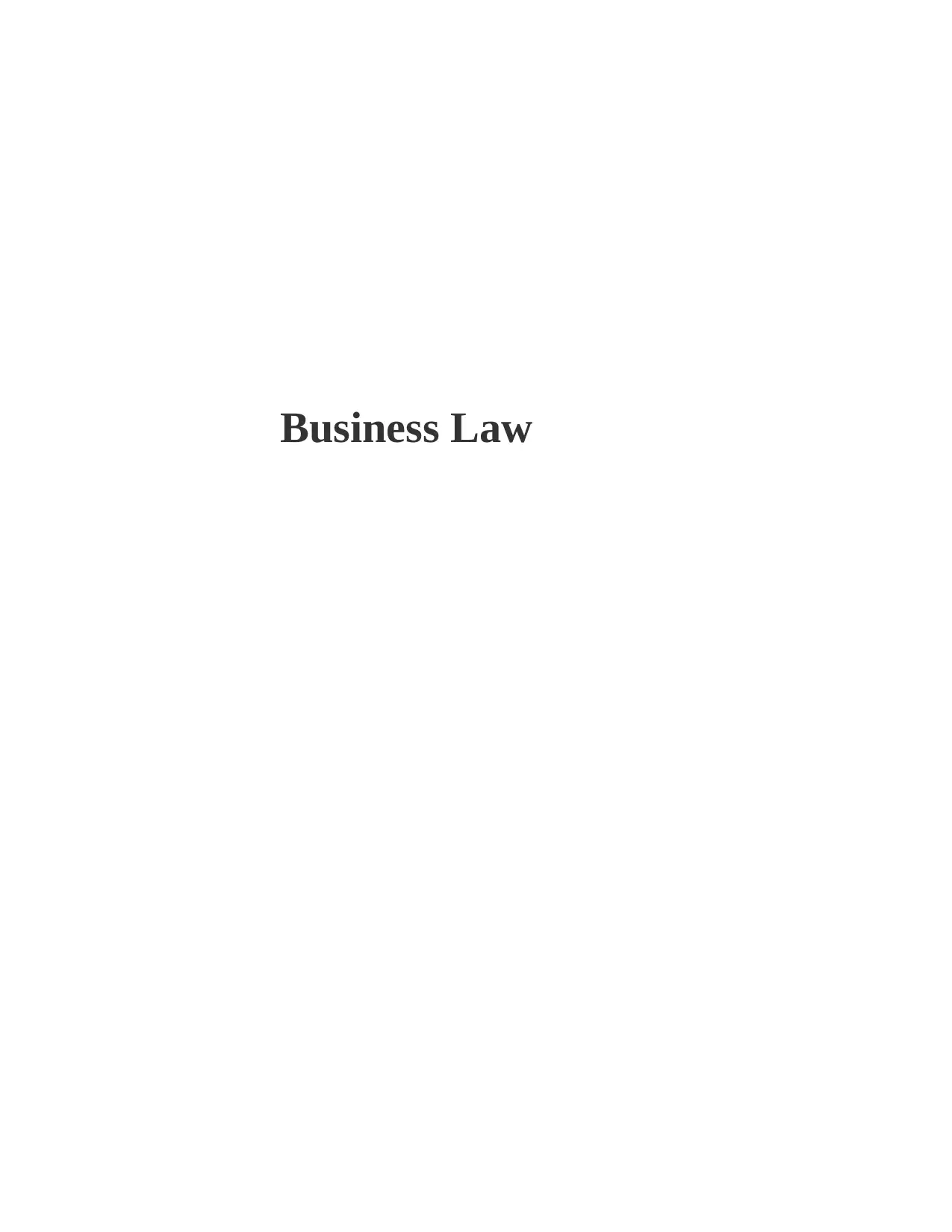
Business Law
Secure Best Marks with AI Grader
Need help grading? Try our AI Grader for instant feedback on your assignments.
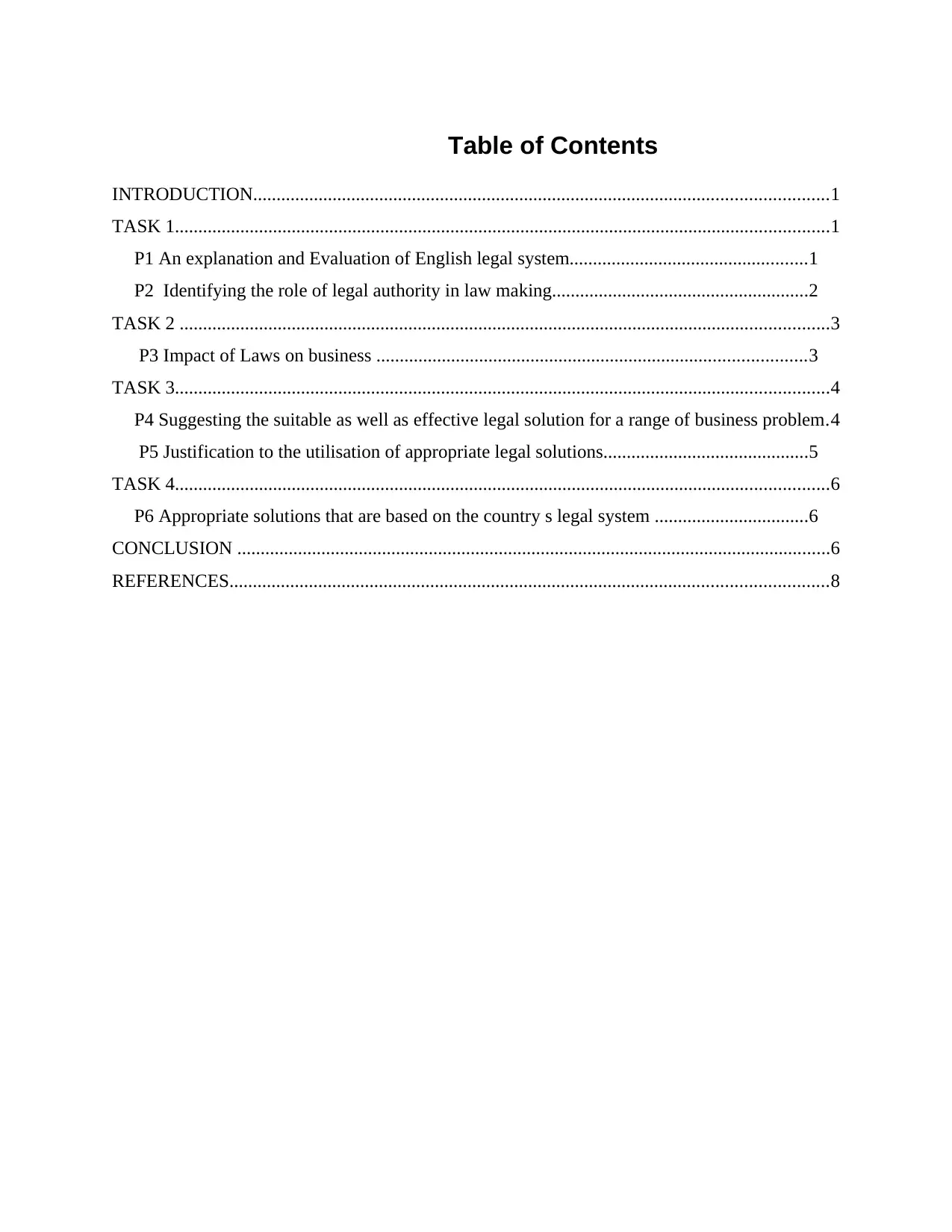
Table of Contents
INTRODUCTION...........................................................................................................................1
TASK 1............................................................................................................................................1
P1 An explanation and Evaluation of English legal system...................................................1
P2 Identifying the role of legal authority in law making.......................................................2
TASK 2 ...........................................................................................................................................3
P3 Impact of Laws on business ............................................................................................3
TASK 3............................................................................................................................................4
P4 Suggesting the suitable as well as effective legal solution for a range of business problem.4
P5 Justification to the utilisation of appropriate legal solutions............................................5
TASK 4............................................................................................................................................6
P6 Appropriate solutions that are based on the country s legal system .................................6
CONCLUSION ...............................................................................................................................6
REFERENCES................................................................................................................................8
INTRODUCTION...........................................................................................................................1
TASK 1............................................................................................................................................1
P1 An explanation and Evaluation of English legal system...................................................1
P2 Identifying the role of legal authority in law making.......................................................2
TASK 2 ...........................................................................................................................................3
P3 Impact of Laws on business ............................................................................................3
TASK 3............................................................................................................................................4
P4 Suggesting the suitable as well as effective legal solution for a range of business problem.4
P5 Justification to the utilisation of appropriate legal solutions............................................5
TASK 4............................................................................................................................................6
P6 Appropriate solutions that are based on the country s legal system .................................6
CONCLUSION ...............................................................................................................................6
REFERENCES................................................................................................................................8
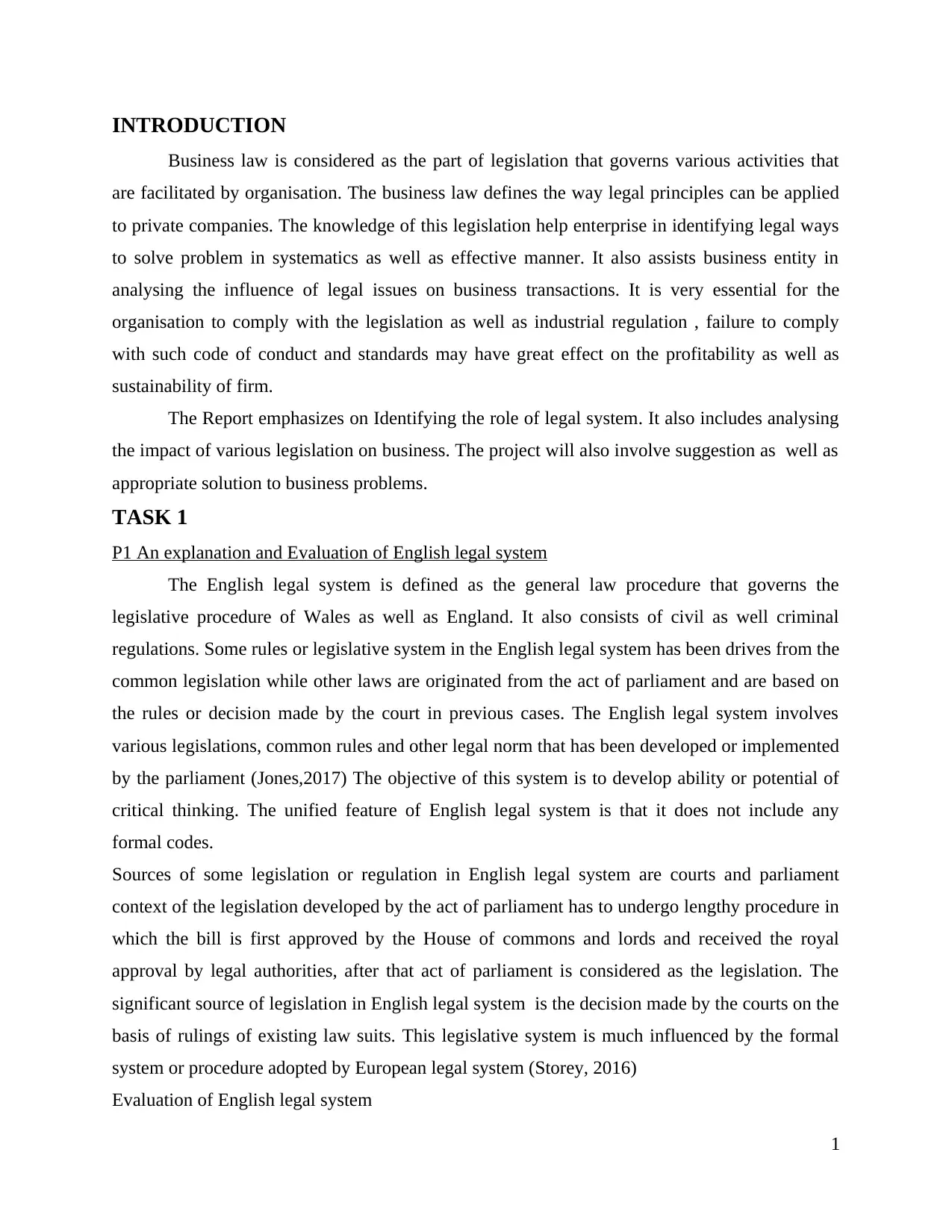
INTRODUCTION
Business law is considered as the part of legislation that governs various activities that
are facilitated by organisation. The business law defines the way legal principles can be applied
to private companies. The knowledge of this legislation help enterprise in identifying legal ways
to solve problem in systematics as well as effective manner. It also assists business entity in
analysing the influence of legal issues on business transactions. It is very essential for the
organisation to comply with the legislation as well as industrial regulation , failure to comply
with such code of conduct and standards may have great effect on the profitability as well as
sustainability of firm.
The Report emphasizes on Identifying the role of legal system. It also includes analysing
the impact of various legislation on business. The project will also involve suggestion as well as
appropriate solution to business problems.
TASK 1
P1 An explanation and Evaluation of English legal system
The English legal system is defined as the general law procedure that governs the
legislative procedure of Wales as well as England. It also consists of civil as well criminal
regulations. Some rules or legislative system in the English legal system has been drives from the
common legislation while other laws are originated from the act of parliament and are based on
the rules or decision made by the court in previous cases. The English legal system involves
various legislations, common rules and other legal norm that has been developed or implemented
by the parliament (Jones,2017) The objective of this system is to develop ability or potential of
critical thinking. The unified feature of English legal system is that it does not include any
formal codes.
Sources of some legislation or regulation in English legal system are courts and parliament
context of the legislation developed by the act of parliament has to undergo lengthy procedure in
which the bill is first approved by the House of commons and lords and received the royal
approval by legal authorities, after that act of parliament is considered as the legislation. The
significant source of legislation in English legal system is the decision made by the courts on the
basis of rulings of existing law suits. This legislative system is much influenced by the formal
system or procedure adopted by European legal system (Storey, 2016)
Evaluation of English legal system
1
Business law is considered as the part of legislation that governs various activities that
are facilitated by organisation. The business law defines the way legal principles can be applied
to private companies. The knowledge of this legislation help enterprise in identifying legal ways
to solve problem in systematics as well as effective manner. It also assists business entity in
analysing the influence of legal issues on business transactions. It is very essential for the
organisation to comply with the legislation as well as industrial regulation , failure to comply
with such code of conduct and standards may have great effect on the profitability as well as
sustainability of firm.
The Report emphasizes on Identifying the role of legal system. It also includes analysing
the impact of various legislation on business. The project will also involve suggestion as well as
appropriate solution to business problems.
TASK 1
P1 An explanation and Evaluation of English legal system
The English legal system is defined as the general law procedure that governs the
legislative procedure of Wales as well as England. It also consists of civil as well criminal
regulations. Some rules or legislative system in the English legal system has been drives from the
common legislation while other laws are originated from the act of parliament and are based on
the rules or decision made by the court in previous cases. The English legal system involves
various legislations, common rules and other legal norm that has been developed or implemented
by the parliament (Jones,2017) The objective of this system is to develop ability or potential of
critical thinking. The unified feature of English legal system is that it does not include any
formal codes.
Sources of some legislation or regulation in English legal system are courts and parliament
context of the legislation developed by the act of parliament has to undergo lengthy procedure in
which the bill is first approved by the House of commons and lords and received the royal
approval by legal authorities, after that act of parliament is considered as the legislation. The
significant source of legislation in English legal system is the decision made by the courts on the
basis of rulings of existing law suits. This legislative system is much influenced by the formal
system or procedure adopted by European legal system (Storey, 2016)
Evaluation of English legal system
1
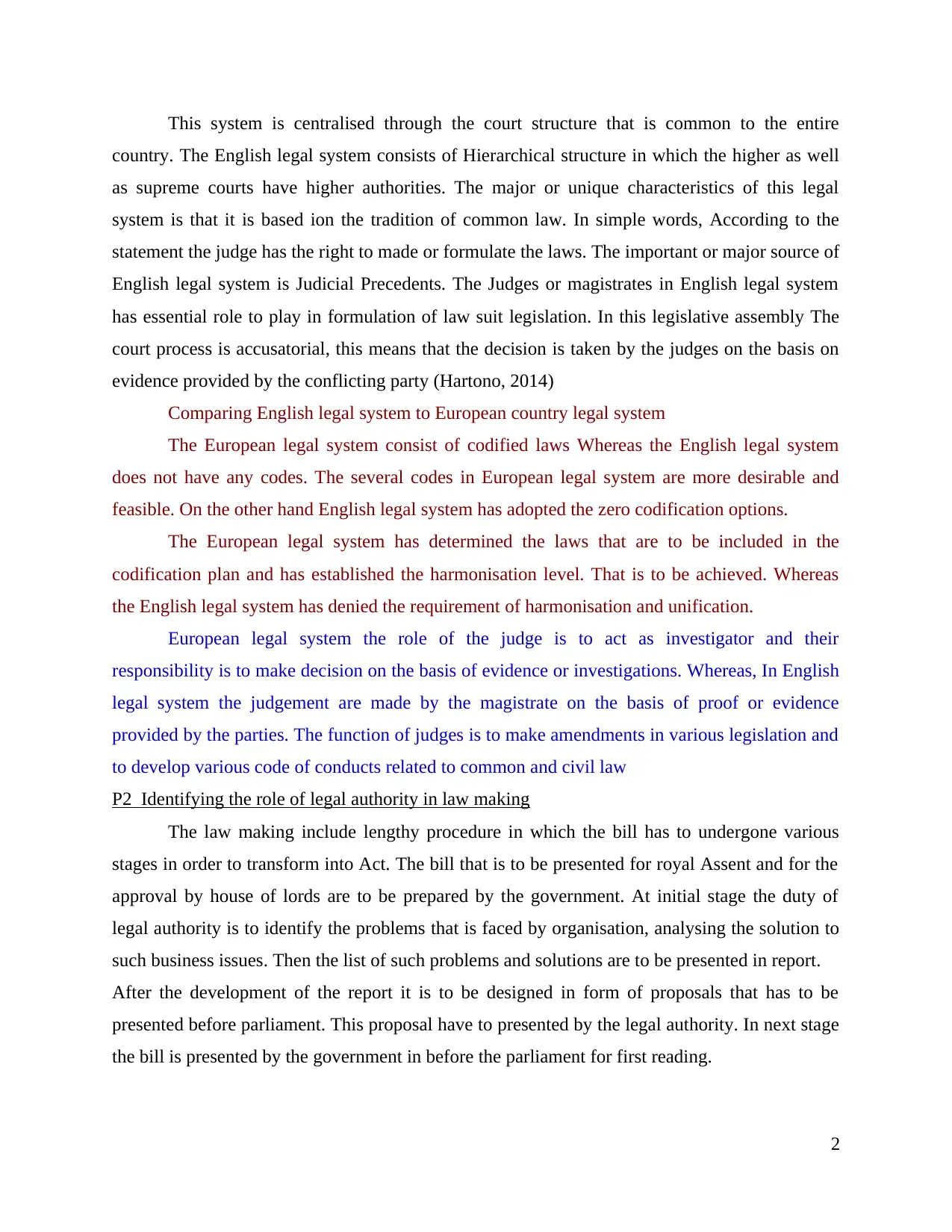
This system is centralised through the court structure that is common to the entire
country. The English legal system consists of Hierarchical structure in which the higher as well
as supreme courts have higher authorities. The major or unique characteristics of this legal
system is that it is based ion the tradition of common law. In simple words, According to the
statement the judge has the right to made or formulate the laws. The important or major source of
English legal system is Judicial Precedents. The Judges or magistrates in English legal system
has essential role to play in formulation of law suit legislation. In this legislative assembly The
court process is accusatorial, this means that the decision is taken by the judges on the basis on
evidence provided by the conflicting party (Hartono, 2014)
Comparing English legal system to European country legal system
The European legal system consist of codified laws Whereas the English legal system
does not have any codes. The several codes in European legal system are more desirable and
feasible. On the other hand English legal system has adopted the zero codification options.
The European legal system has determined the laws that are to be included in the
codification plan and has established the harmonisation level. That is to be achieved. Whereas
the English legal system has denied the requirement of harmonisation and unification.
European legal system the role of the judge is to act as investigator and their
responsibility is to make decision on the basis of evidence or investigations. Whereas, In English
legal system the judgement are made by the magistrate on the basis of proof or evidence
provided by the parties. The function of judges is to make amendments in various legislation and
to develop various code of conducts related to common and civil law
P2 Identifying the role of legal authority in law making
The law making include lengthy procedure in which the bill has to undergone various
stages in order to transform into Act. The bill that is to be presented for royal Assent and for the
approval by house of lords are to be prepared by the government. At initial stage the duty of
legal authority is to identify the problems that is faced by organisation, analysing the solution to
such business issues. Then the list of such problems and solutions are to be presented in report.
After the development of the report it is to be designed in form of proposals that has to be
presented before parliament. This proposal have to presented by the legal authority. In next stage
the bill is presented by the government in before the parliament for first reading.
2
country. The English legal system consists of Hierarchical structure in which the higher as well
as supreme courts have higher authorities. The major or unique characteristics of this legal
system is that it is based ion the tradition of common law. In simple words, According to the
statement the judge has the right to made or formulate the laws. The important or major source of
English legal system is Judicial Precedents. The Judges or magistrates in English legal system
has essential role to play in formulation of law suit legislation. In this legislative assembly The
court process is accusatorial, this means that the decision is taken by the judges on the basis on
evidence provided by the conflicting party (Hartono, 2014)
Comparing English legal system to European country legal system
The European legal system consist of codified laws Whereas the English legal system
does not have any codes. The several codes in European legal system are more desirable and
feasible. On the other hand English legal system has adopted the zero codification options.
The European legal system has determined the laws that are to be included in the
codification plan and has established the harmonisation level. That is to be achieved. Whereas
the English legal system has denied the requirement of harmonisation and unification.
European legal system the role of the judge is to act as investigator and their
responsibility is to make decision on the basis of evidence or investigations. Whereas, In English
legal system the judgement are made by the magistrate on the basis of proof or evidence
provided by the parties. The function of judges is to make amendments in various legislation and
to develop various code of conducts related to common and civil law
P2 Identifying the role of legal authority in law making
The law making include lengthy procedure in which the bill has to undergone various
stages in order to transform into Act. The bill that is to be presented for royal Assent and for the
approval by house of lords are to be prepared by the government. At initial stage the duty of
legal authority is to identify the problems that is faced by organisation, analysing the solution to
such business issues. Then the list of such problems and solutions are to be presented in report.
After the development of the report it is to be designed in form of proposals that has to be
presented before parliament. This proposal have to presented by the legal authority. In next stage
the bill is presented by the government in before the parliament for first reading.
2
Secure Best Marks with AI Grader
Need help grading? Try our AI Grader for instant feedback on your assignments.
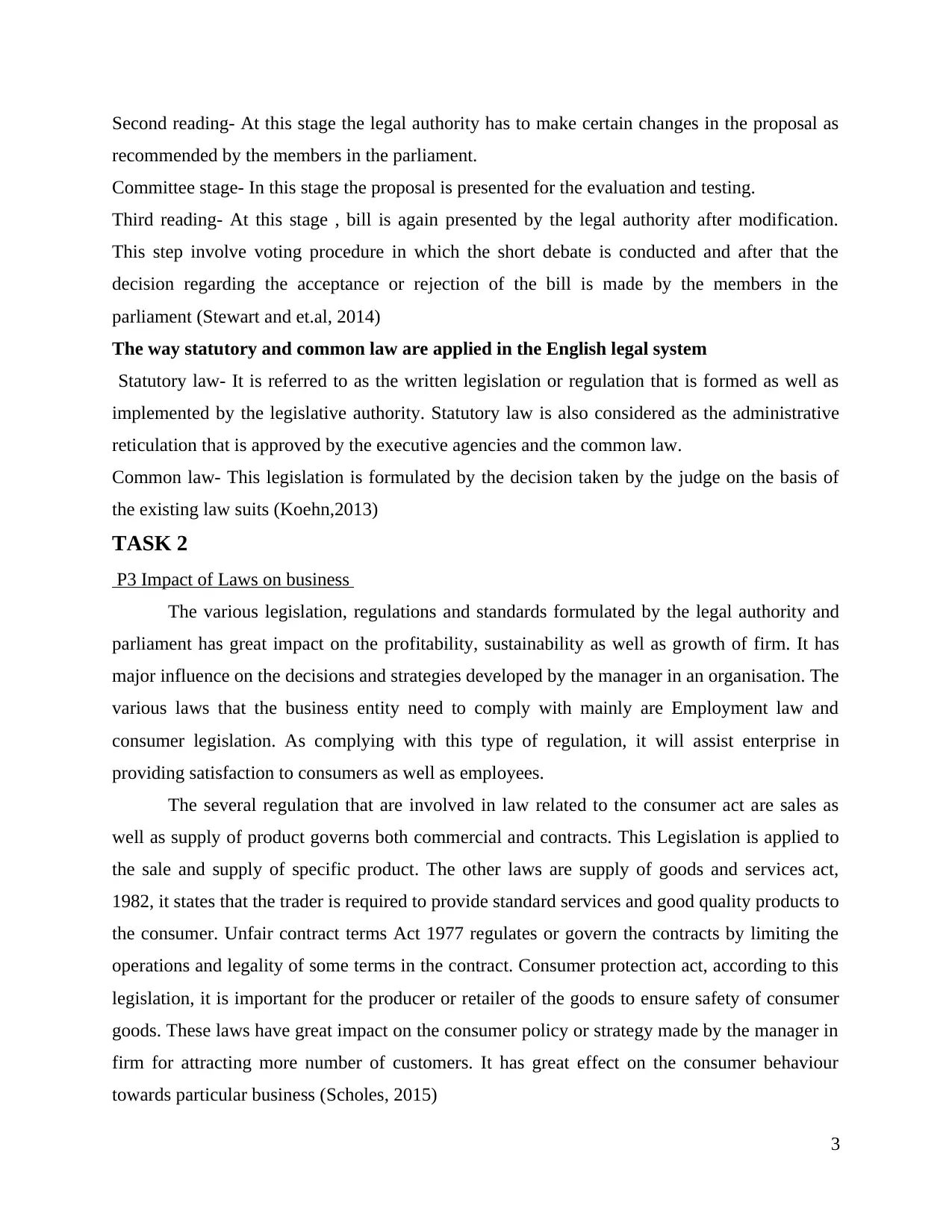
Second reading- At this stage the legal authority has to make certain changes in the proposal as
recommended by the members in the parliament.
Committee stage- In this stage the proposal is presented for the evaluation and testing.
Third reading- At this stage , bill is again presented by the legal authority after modification.
This step involve voting procedure in which the short debate is conducted and after that the
decision regarding the acceptance or rejection of the bill is made by the members in the
parliament (Stewart and et.al, 2014)
The way statutory and common law are applied in the English legal system
Statutory law- It is referred to as the written legislation or regulation that is formed as well as
implemented by the legislative authority. Statutory law is also considered as the administrative
reticulation that is approved by the executive agencies and the common law.
Common law- This legislation is formulated by the decision taken by the judge on the basis of
the existing law suits (Koehn,2013)
TASK 2
P3 Impact of Laws on business
The various legislation, regulations and standards formulated by the legal authority and
parliament has great impact on the profitability, sustainability as well as growth of firm. It has
major influence on the decisions and strategies developed by the manager in an organisation. The
various laws that the business entity need to comply with mainly are Employment law and
consumer legislation. As complying with this type of regulation, it will assist enterprise in
providing satisfaction to consumers as well as employees.
The several regulation that are involved in law related to the consumer act are sales as
well as supply of product governs both commercial and contracts. This Legislation is applied to
the sale and supply of specific product. The other laws are supply of goods and services act,
1982, it states that the trader is required to provide standard services and good quality products to
the consumer. Unfair contract terms Act 1977 regulates or govern the contracts by limiting the
operations and legality of some terms in the contract. Consumer protection act, according to this
legislation, it is important for the producer or retailer of the goods to ensure safety of consumer
goods. These laws have great impact on the consumer policy or strategy made by the manager in
firm for attracting more number of customers. It has great effect on the consumer behaviour
towards particular business (Scholes, 2015)
3
recommended by the members in the parliament.
Committee stage- In this stage the proposal is presented for the evaluation and testing.
Third reading- At this stage , bill is again presented by the legal authority after modification.
This step involve voting procedure in which the short debate is conducted and after that the
decision regarding the acceptance or rejection of the bill is made by the members in the
parliament (Stewart and et.al, 2014)
The way statutory and common law are applied in the English legal system
Statutory law- It is referred to as the written legislation or regulation that is formed as well as
implemented by the legislative authority. Statutory law is also considered as the administrative
reticulation that is approved by the executive agencies and the common law.
Common law- This legislation is formulated by the decision taken by the judge on the basis of
the existing law suits (Koehn,2013)
TASK 2
P3 Impact of Laws on business
The various legislation, regulations and standards formulated by the legal authority and
parliament has great impact on the profitability, sustainability as well as growth of firm. It has
major influence on the decisions and strategies developed by the manager in an organisation. The
various laws that the business entity need to comply with mainly are Employment law and
consumer legislation. As complying with this type of regulation, it will assist enterprise in
providing satisfaction to consumers as well as employees.
The several regulation that are involved in law related to the consumer act are sales as
well as supply of product governs both commercial and contracts. This Legislation is applied to
the sale and supply of specific product. The other laws are supply of goods and services act,
1982, it states that the trader is required to provide standard services and good quality products to
the consumer. Unfair contract terms Act 1977 regulates or govern the contracts by limiting the
operations and legality of some terms in the contract. Consumer protection act, according to this
legislation, it is important for the producer or retailer of the goods to ensure safety of consumer
goods. These laws have great impact on the consumer policy or strategy made by the manager in
firm for attracting more number of customers. It has great effect on the consumer behaviour
towards particular business (Scholes, 2015)
3
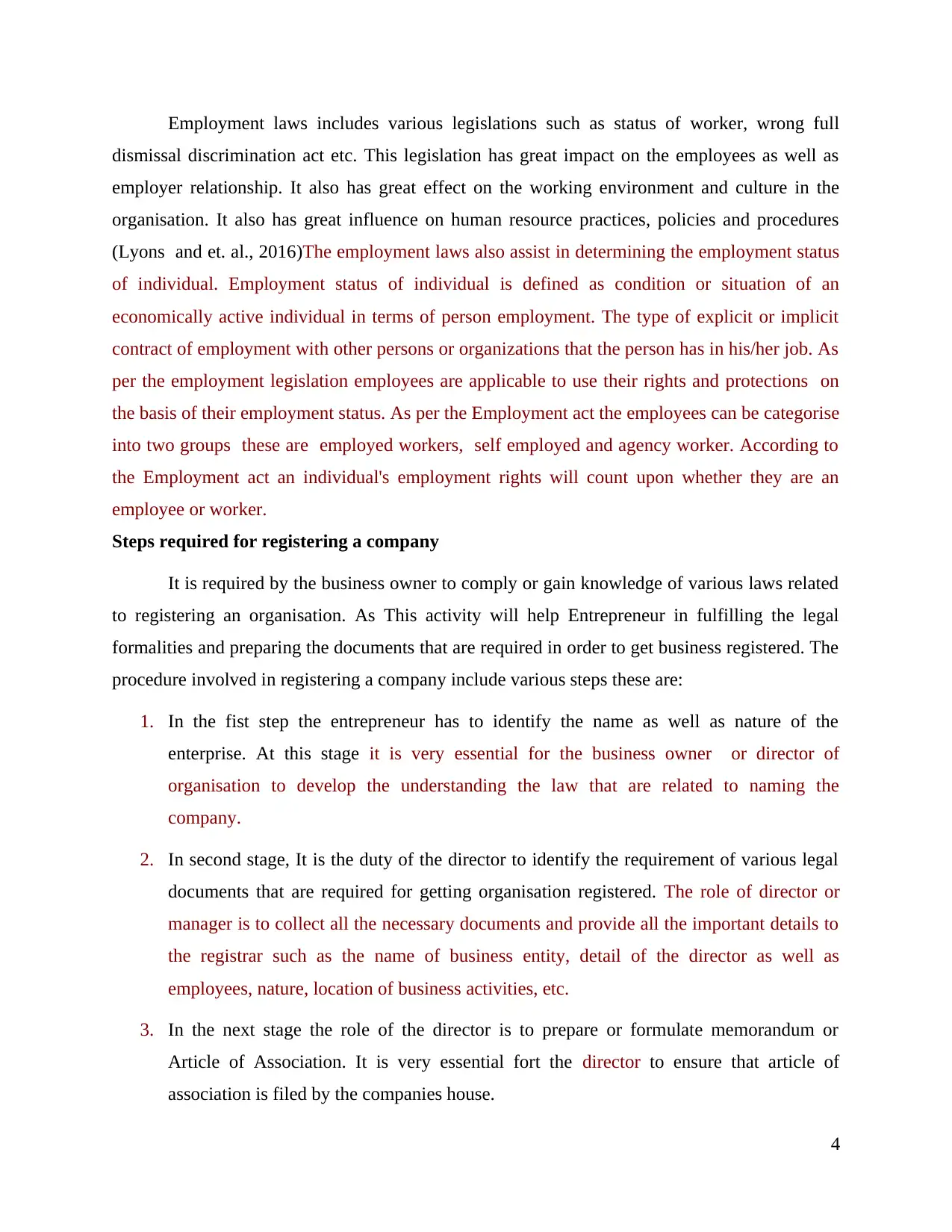
Employment laws includes various legislations such as status of worker, wrong full
dismissal discrimination act etc. This legislation has great impact on the employees as well as
employer relationship. It also has great effect on the working environment and culture in the
organisation. It also has great influence on human resource practices, policies and procedures
(Lyons and et. al., 2016)The employment laws also assist in determining the employment status
of individual. Employment status of individual is defined as condition or situation of an
economically active individual in terms of person employment. The type of explicit or implicit
contract of employment with other persons or organizations that the person has in his/her job. As
per the employment legislation employees are applicable to use their rights and protections on
the basis of their employment status. As per the Employment act the employees can be categorise
into two groups these are employed workers, self employed and agency worker. According to
the Employment act an individual's employment rights will count upon whether they are an
employee or worker.
Steps required for registering a company
It is required by the business owner to comply or gain knowledge of various laws related
to registering an organisation. As This activity will help Entrepreneur in fulfilling the legal
formalities and preparing the documents that are required in order to get business registered. The
procedure involved in registering a company include various steps these are:
1. In the fist step the entrepreneur has to identify the name as well as nature of the
enterprise. At this stage it is very essential for the business owner or director of
organisation to develop the understanding the law that are related to naming the
company.
2. In second stage, It is the duty of the director to identify the requirement of various legal
documents that are required for getting organisation registered. The role of director or
manager is to collect all the necessary documents and provide all the important details to
the registrar such as the name of business entity, detail of the director as well as
employees, nature, location of business activities, etc.
3. In the next stage the role of the director is to prepare or formulate memorandum or
Article of Association. It is very essential fort the director to ensure that article of
association is filed by the companies house.
4
dismissal discrimination act etc. This legislation has great impact on the employees as well as
employer relationship. It also has great effect on the working environment and culture in the
organisation. It also has great influence on human resource practices, policies and procedures
(Lyons and et. al., 2016)The employment laws also assist in determining the employment status
of individual. Employment status of individual is defined as condition or situation of an
economically active individual in terms of person employment. The type of explicit or implicit
contract of employment with other persons or organizations that the person has in his/her job. As
per the employment legislation employees are applicable to use their rights and protections on
the basis of their employment status. As per the Employment act the employees can be categorise
into two groups these are employed workers, self employed and agency worker. According to
the Employment act an individual's employment rights will count upon whether they are an
employee or worker.
Steps required for registering a company
It is required by the business owner to comply or gain knowledge of various laws related
to registering an organisation. As This activity will help Entrepreneur in fulfilling the legal
formalities and preparing the documents that are required in order to get business registered. The
procedure involved in registering a company include various steps these are:
1. In the fist step the entrepreneur has to identify the name as well as nature of the
enterprise. At this stage it is very essential for the business owner or director of
organisation to develop the understanding the law that are related to naming the
company.
2. In second stage, It is the duty of the director to identify the requirement of various legal
documents that are required for getting organisation registered. The role of director or
manager is to collect all the necessary documents and provide all the important details to
the registrar such as the name of business entity, detail of the director as well as
employees, nature, location of business activities, etc.
3. In the next stage the role of the director is to prepare or formulate memorandum or
Article of Association. It is very essential fort the director to ensure that article of
association is filed by the companies house.
4
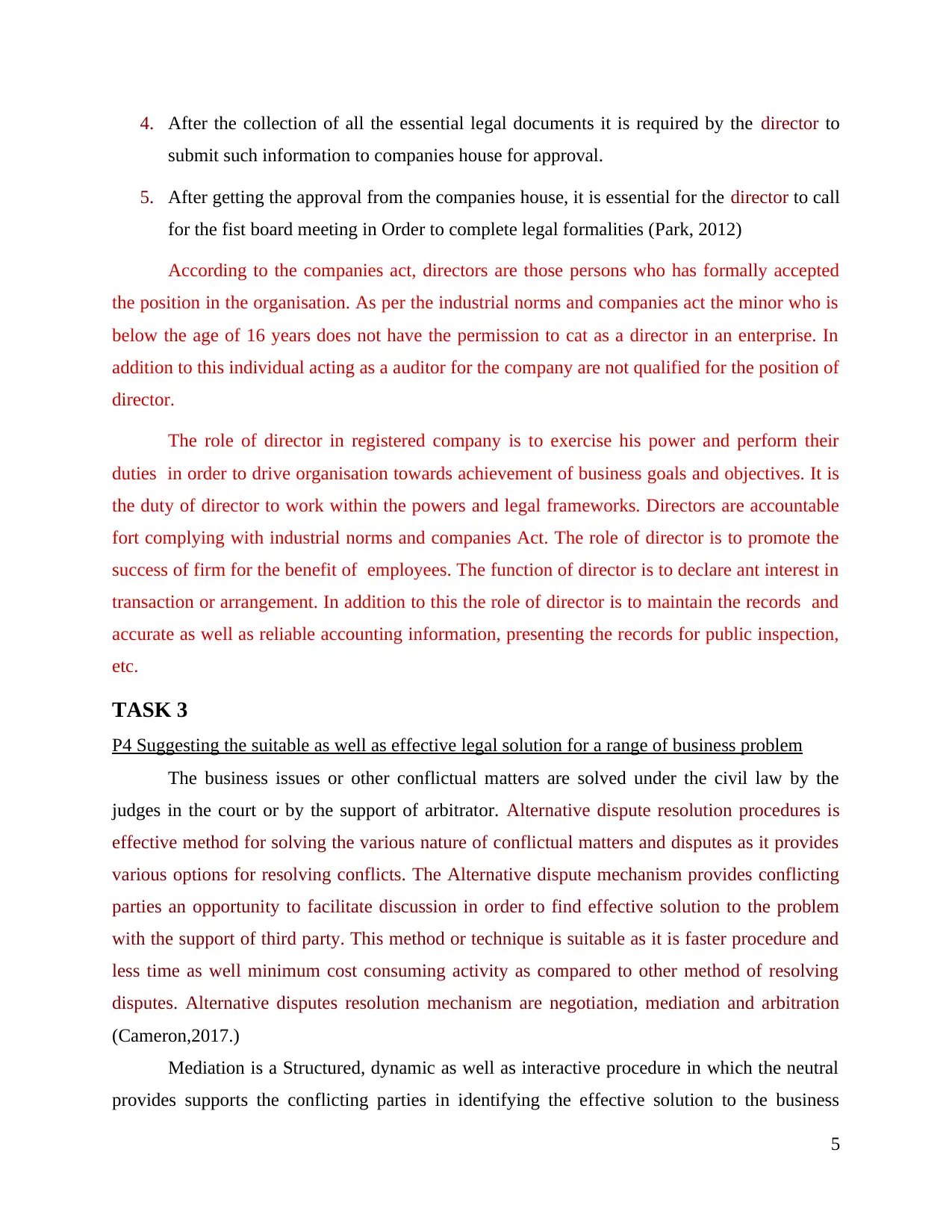
4. After the collection of all the essential legal documents it is required by the director to
submit such information to companies house for approval.
5. After getting the approval from the companies house, it is essential for the director to call
for the fist board meeting in Order to complete legal formalities (Park, 2012)
According to the companies act, directors are those persons who has formally accepted
the position in the organisation. As per the industrial norms and companies act the minor who is
below the age of 16 years does not have the permission to cat as a director in an enterprise. In
addition to this individual acting as a auditor for the company are not qualified for the position of
director.
The role of director in registered company is to exercise his power and perform their
duties in order to drive organisation towards achievement of business goals and objectives. It is
the duty of director to work within the powers and legal frameworks. Directors are accountable
fort complying with industrial norms and companies Act. The role of director is to promote the
success of firm for the benefit of employees. The function of director is to declare ant interest in
transaction or arrangement. In addition to this the role of director is to maintain the records and
accurate as well as reliable accounting information, presenting the records for public inspection,
etc.
TASK 3
P4 Suggesting the suitable as well as effective legal solution for a range of business problem
The business issues or other conflictual matters are solved under the civil law by the
judges in the court or by the support of arbitrator. Alternative dispute resolution procedures is
effective method for solving the various nature of conflictual matters and disputes as it provides
various options for resolving conflicts. The Alternative dispute mechanism provides conflicting
parties an opportunity to facilitate discussion in order to find effective solution to the problem
with the support of third party. This method or technique is suitable as it is faster procedure and
less time as well minimum cost consuming activity as compared to other method of resolving
disputes. Alternative disputes resolution mechanism are negotiation, mediation and arbitration
(Cameron,2017.)
Mediation is a Structured, dynamic as well as interactive procedure in which the neutral
provides supports the conflicting parties in identifying the effective solution to the business
5
submit such information to companies house for approval.
5. After getting the approval from the companies house, it is essential for the director to call
for the fist board meeting in Order to complete legal formalities (Park, 2012)
According to the companies act, directors are those persons who has formally accepted
the position in the organisation. As per the industrial norms and companies act the minor who is
below the age of 16 years does not have the permission to cat as a director in an enterprise. In
addition to this individual acting as a auditor for the company are not qualified for the position of
director.
The role of director in registered company is to exercise his power and perform their
duties in order to drive organisation towards achievement of business goals and objectives. It is
the duty of director to work within the powers and legal frameworks. Directors are accountable
fort complying with industrial norms and companies Act. The role of director is to promote the
success of firm for the benefit of employees. The function of director is to declare ant interest in
transaction or arrangement. In addition to this the role of director is to maintain the records and
accurate as well as reliable accounting information, presenting the records for public inspection,
etc.
TASK 3
P4 Suggesting the suitable as well as effective legal solution for a range of business problem
The business issues or other conflictual matters are solved under the civil law by the
judges in the court or by the support of arbitrator. Alternative dispute resolution procedures is
effective method for solving the various nature of conflictual matters and disputes as it provides
various options for resolving conflicts. The Alternative dispute mechanism provides conflicting
parties an opportunity to facilitate discussion in order to find effective solution to the problem
with the support of third party. This method or technique is suitable as it is faster procedure and
less time as well minimum cost consuming activity as compared to other method of resolving
disputes. Alternative disputes resolution mechanism are negotiation, mediation and arbitration
(Cameron,2017.)
Mediation is a Structured, dynamic as well as interactive procedure in which the neutral
provides supports the conflicting parties in identifying the effective solution to the business
5
Paraphrase This Document
Need a fresh take? Get an instant paraphrase of this document with our AI Paraphraser
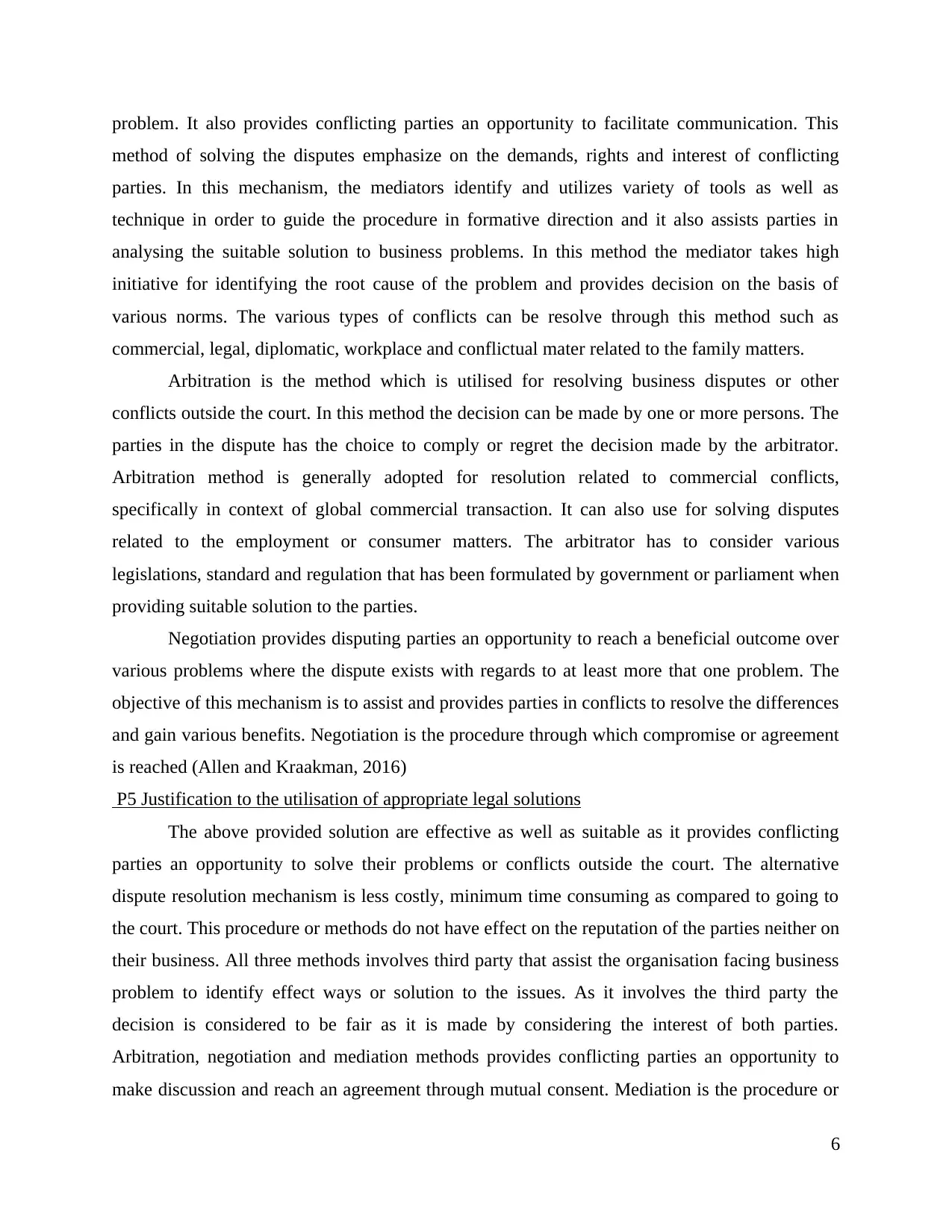
problem. It also provides conflicting parties an opportunity to facilitate communication. This
method of solving the disputes emphasize on the demands, rights and interest of conflicting
parties. In this mechanism, the mediators identify and utilizes variety of tools as well as
technique in order to guide the procedure in formative direction and it also assists parties in
analysing the suitable solution to business problems. In this method the mediator takes high
initiative for identifying the root cause of the problem and provides decision on the basis of
various norms. The various types of conflicts can be resolve through this method such as
commercial, legal, diplomatic, workplace and conflictual mater related to the family matters.
Arbitration is the method which is utilised for resolving business disputes or other
conflicts outside the court. In this method the decision can be made by one or more persons. The
parties in the dispute has the choice to comply or regret the decision made by the arbitrator.
Arbitration method is generally adopted for resolution related to commercial conflicts,
specifically in context of global commercial transaction. It can also use for solving disputes
related to the employment or consumer matters. The arbitrator has to consider various
legislations, standard and regulation that has been formulated by government or parliament when
providing suitable solution to the parties.
Negotiation provides disputing parties an opportunity to reach a beneficial outcome over
various problems where the dispute exists with regards to at least more that one problem. The
objective of this mechanism is to assist and provides parties in conflicts to resolve the differences
and gain various benefits. Negotiation is the procedure through which compromise or agreement
is reached (Allen and Kraakman, 2016)
P5 Justification to the utilisation of appropriate legal solutions
The above provided solution are effective as well as suitable as it provides conflicting
parties an opportunity to solve their problems or conflicts outside the court. The alternative
dispute resolution mechanism is less costly, minimum time consuming as compared to going to
the court. This procedure or methods do not have effect on the reputation of the parties neither on
their business. All three methods involves third party that assist the organisation facing business
problem to identify effect ways or solution to the issues. As it involves the third party the
decision is considered to be fair as it is made by considering the interest of both parties.
Arbitration, negotiation and mediation methods provides conflicting parties an opportunity to
make discussion and reach an agreement through mutual consent. Mediation is the procedure or
6
method of solving the disputes emphasize on the demands, rights and interest of conflicting
parties. In this mechanism, the mediators identify and utilizes variety of tools as well as
technique in order to guide the procedure in formative direction and it also assists parties in
analysing the suitable solution to business problems. In this method the mediator takes high
initiative for identifying the root cause of the problem and provides decision on the basis of
various norms. The various types of conflicts can be resolve through this method such as
commercial, legal, diplomatic, workplace and conflictual mater related to the family matters.
Arbitration is the method which is utilised for resolving business disputes or other
conflicts outside the court. In this method the decision can be made by one or more persons. The
parties in the dispute has the choice to comply or regret the decision made by the arbitrator.
Arbitration method is generally adopted for resolution related to commercial conflicts,
specifically in context of global commercial transaction. It can also use for solving disputes
related to the employment or consumer matters. The arbitrator has to consider various
legislations, standard and regulation that has been formulated by government or parliament when
providing suitable solution to the parties.
Negotiation provides disputing parties an opportunity to reach a beneficial outcome over
various problems where the dispute exists with regards to at least more that one problem. The
objective of this mechanism is to assist and provides parties in conflicts to resolve the differences
and gain various benefits. Negotiation is the procedure through which compromise or agreement
is reached (Allen and Kraakman, 2016)
P5 Justification to the utilisation of appropriate legal solutions
The above provided solution are effective as well as suitable as it provides conflicting
parties an opportunity to solve their problems or conflicts outside the court. The alternative
dispute resolution mechanism is less costly, minimum time consuming as compared to going to
the court. This procedure or methods do not have effect on the reputation of the parties neither on
their business. All three methods involves third party that assist the organisation facing business
problem to identify effect ways or solution to the issues. As it involves the third party the
decision is considered to be fair as it is made by considering the interest of both parties.
Arbitration, negotiation and mediation methods provides conflicting parties an opportunity to
make discussion and reach an agreement through mutual consent. Mediation is the procedure or
6
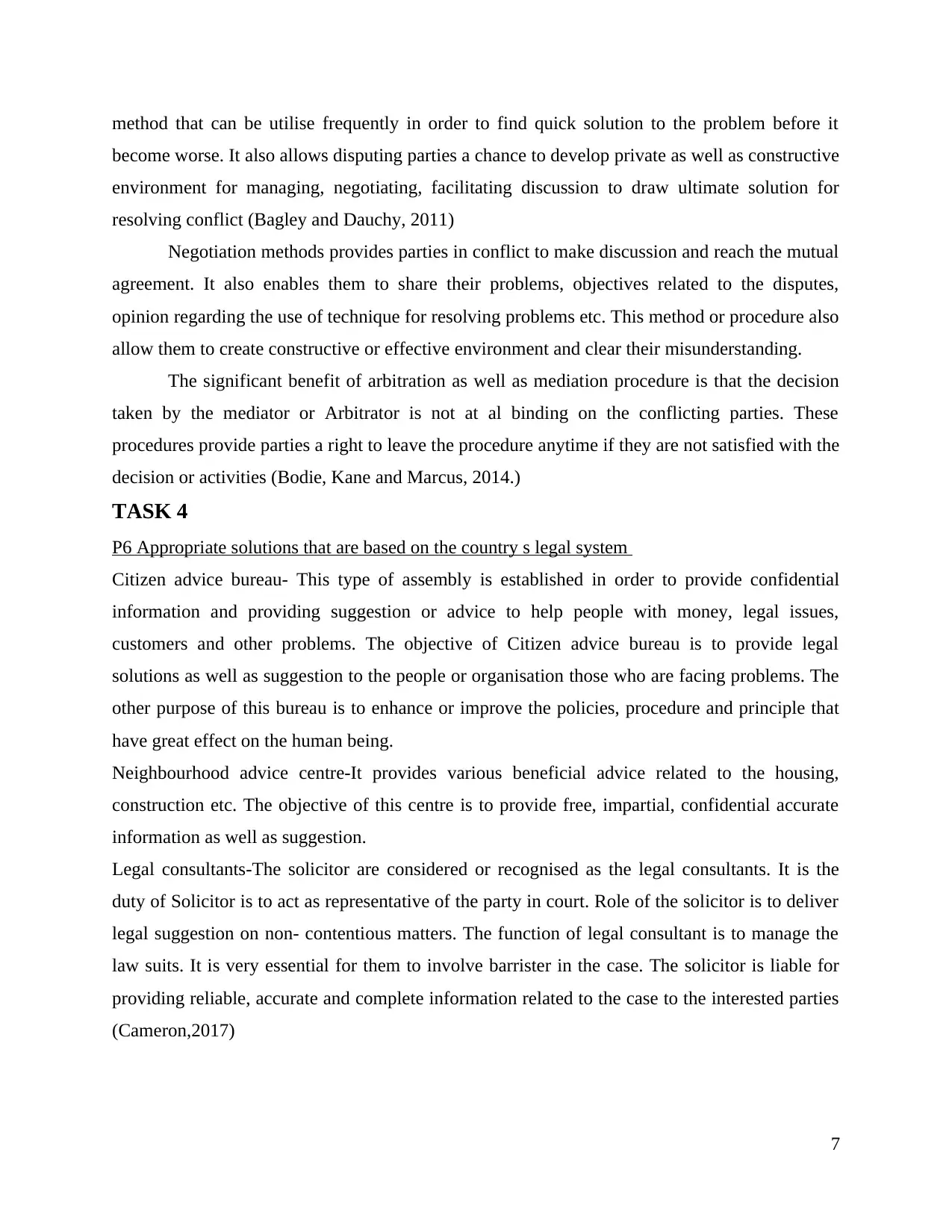
method that can be utilise frequently in order to find quick solution to the problem before it
become worse. It also allows disputing parties a chance to develop private as well as constructive
environment for managing, negotiating, facilitating discussion to draw ultimate solution for
resolving conflict (Bagley and Dauchy, 2011)
Negotiation methods provides parties in conflict to make discussion and reach the mutual
agreement. It also enables them to share their problems, objectives related to the disputes,
opinion regarding the use of technique for resolving problems etc. This method or procedure also
allow them to create constructive or effective environment and clear their misunderstanding.
The significant benefit of arbitration as well as mediation procedure is that the decision
taken by the mediator or Arbitrator is not at al binding on the conflicting parties. These
procedures provide parties a right to leave the procedure anytime if they are not satisfied with the
decision or activities (Bodie, Kane and Marcus, 2014.)
TASK 4
P6 Appropriate solutions that are based on the country s legal system
Citizen advice bureau- This type of assembly is established in order to provide confidential
information and providing suggestion or advice to help people with money, legal issues,
customers and other problems. The objective of Citizen advice bureau is to provide legal
solutions as well as suggestion to the people or organisation those who are facing problems. The
other purpose of this bureau is to enhance or improve the policies, procedure and principle that
have great effect on the human being.
Neighbourhood advice centre-It provides various beneficial advice related to the housing,
construction etc. The objective of this centre is to provide free, impartial, confidential accurate
information as well as suggestion.
Legal consultants-The solicitor are considered or recognised as the legal consultants. It is the
duty of Solicitor is to act as representative of the party in court. Role of the solicitor is to deliver
legal suggestion on non- contentious matters. The function of legal consultant is to manage the
law suits. It is very essential for them to involve barrister in the case. The solicitor is liable for
providing reliable, accurate and complete information related to the case to the interested parties
(Cameron,2017)
7
become worse. It also allows disputing parties a chance to develop private as well as constructive
environment for managing, negotiating, facilitating discussion to draw ultimate solution for
resolving conflict (Bagley and Dauchy, 2011)
Negotiation methods provides parties in conflict to make discussion and reach the mutual
agreement. It also enables them to share their problems, objectives related to the disputes,
opinion regarding the use of technique for resolving problems etc. This method or procedure also
allow them to create constructive or effective environment and clear their misunderstanding.
The significant benefit of arbitration as well as mediation procedure is that the decision
taken by the mediator or Arbitrator is not at al binding on the conflicting parties. These
procedures provide parties a right to leave the procedure anytime if they are not satisfied with the
decision or activities (Bodie, Kane and Marcus, 2014.)
TASK 4
P6 Appropriate solutions that are based on the country s legal system
Citizen advice bureau- This type of assembly is established in order to provide confidential
information and providing suggestion or advice to help people with money, legal issues,
customers and other problems. The objective of Citizen advice bureau is to provide legal
solutions as well as suggestion to the people or organisation those who are facing problems. The
other purpose of this bureau is to enhance or improve the policies, procedure and principle that
have great effect on the human being.
Neighbourhood advice centre-It provides various beneficial advice related to the housing,
construction etc. The objective of this centre is to provide free, impartial, confidential accurate
information as well as suggestion.
Legal consultants-The solicitor are considered or recognised as the legal consultants. It is the
duty of Solicitor is to act as representative of the party in court. Role of the solicitor is to deliver
legal suggestion on non- contentious matters. The function of legal consultant is to manage the
law suits. It is very essential for them to involve barrister in the case. The solicitor is liable for
providing reliable, accurate and complete information related to the case to the interested parties
(Cameron,2017)
7
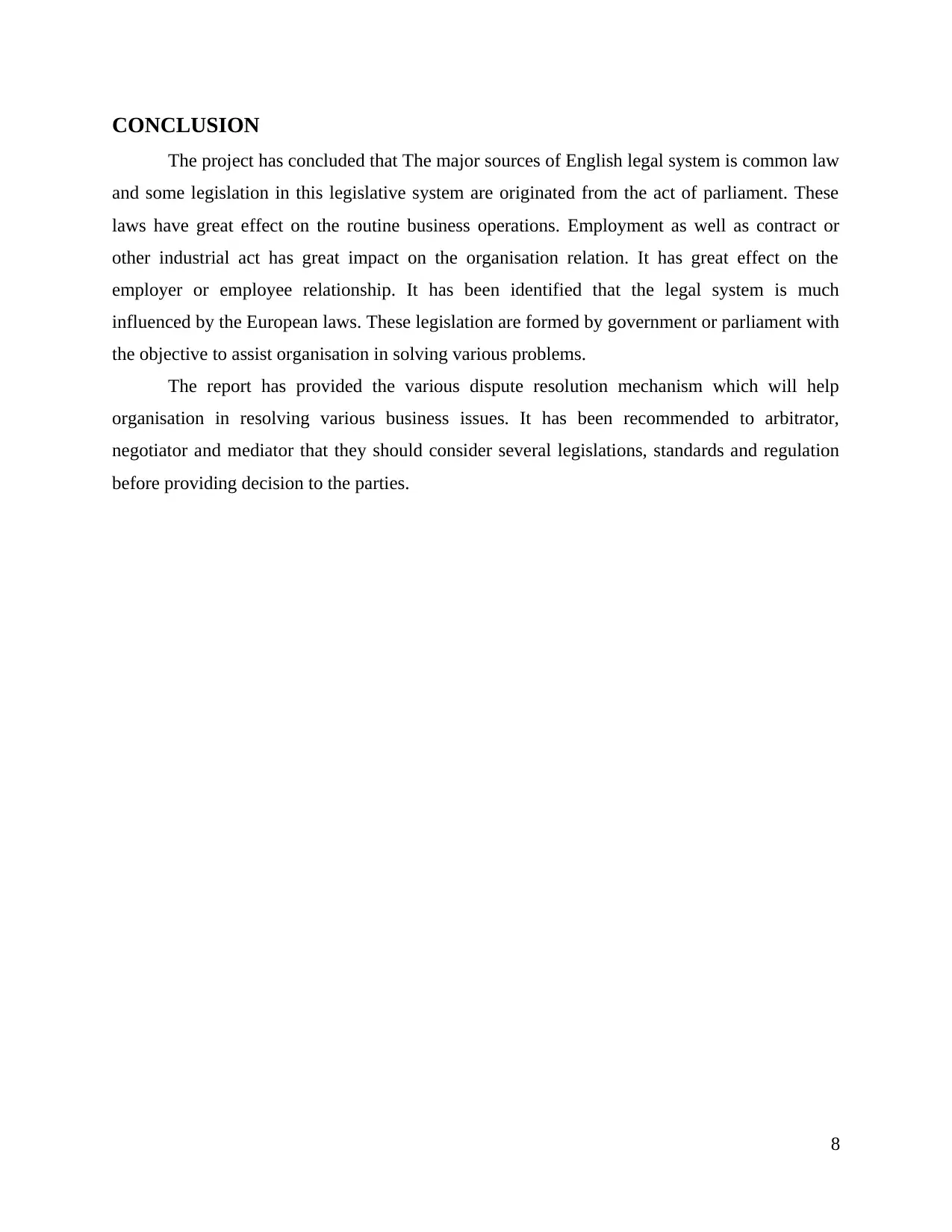
CONCLUSION
The project has concluded that The major sources of English legal system is common law
and some legislation in this legislative system are originated from the act of parliament. These
laws have great effect on the routine business operations. Employment as well as contract or
other industrial act has great impact on the organisation relation. It has great effect on the
employer or employee relationship. It has been identified that the legal system is much
influenced by the European laws. These legislation are formed by government or parliament with
the objective to assist organisation in solving various problems.
The report has provided the various dispute resolution mechanism which will help
organisation in resolving various business issues. It has been recommended to arbitrator,
negotiator and mediator that they should consider several legislations, standards and regulation
before providing decision to the parties.
8
The project has concluded that The major sources of English legal system is common law
and some legislation in this legislative system are originated from the act of parliament. These
laws have great effect on the routine business operations. Employment as well as contract or
other industrial act has great impact on the organisation relation. It has great effect on the
employer or employee relationship. It has been identified that the legal system is much
influenced by the European laws. These legislation are formed by government or parliament with
the objective to assist organisation in solving various problems.
The report has provided the various dispute resolution mechanism which will help
organisation in resolving various business issues. It has been recommended to arbitrator,
negotiator and mediator that they should consider several legislations, standards and regulation
before providing decision to the parties.
8
Secure Best Marks with AI Grader
Need help grading? Try our AI Grader for instant feedback on your assignments.
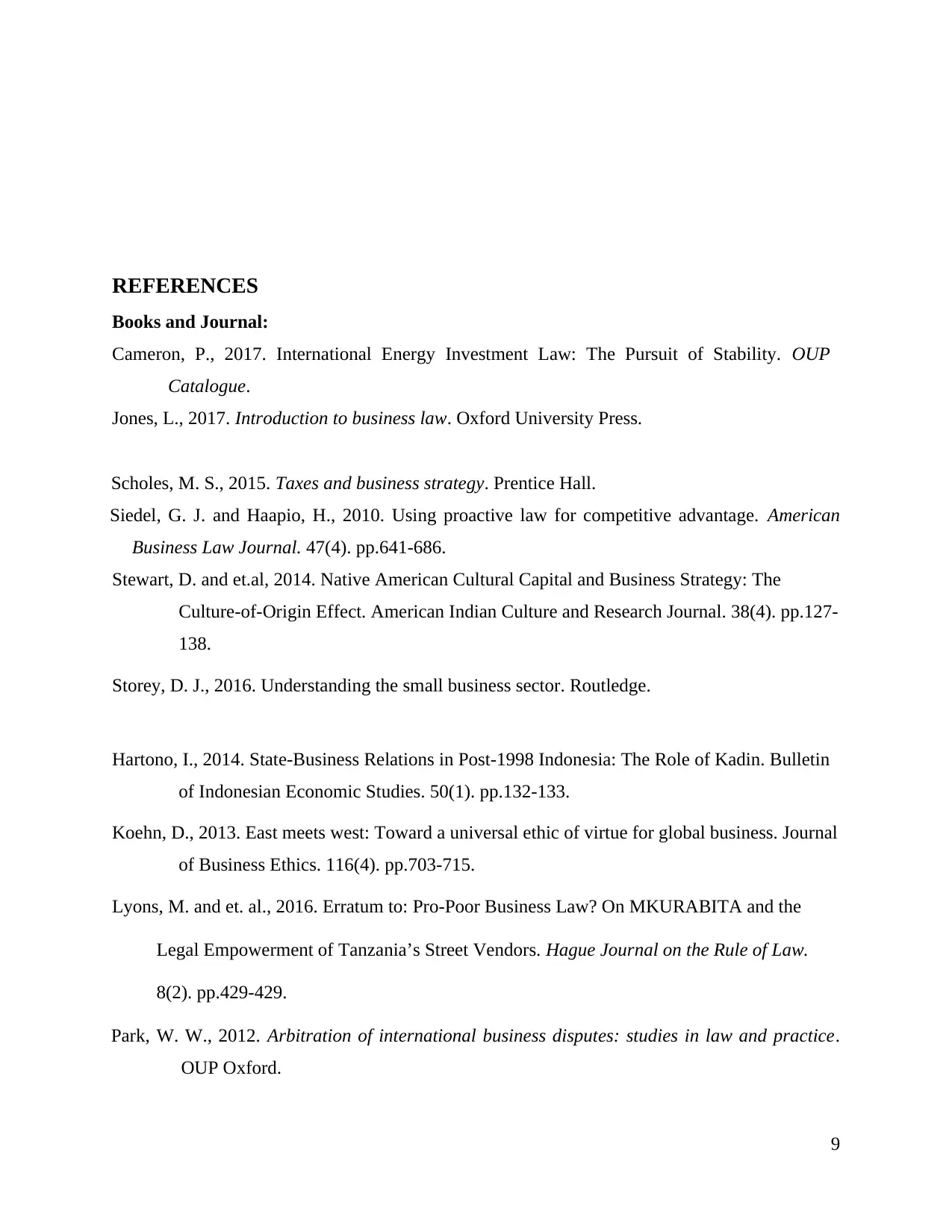
REFERENCES
Books and Journal:
Cameron, P., 2017. International Energy Investment Law: The Pursuit of Stability. OUP
Catalogue.
Jones, L., 2017. Introduction to business law. Oxford University Press.
Scholes, M. S., 2015. Taxes and business strategy. Prentice Hall.
Siedel, G. J. and Haapio, H., 2010. Using proactive law for competitive advantage. American
Business Law Journal. 47(4). pp.641-686.
Stewart, D. and et.al, 2014. Native American Cultural Capital and Business Strategy: The
Culture-of-Origin Effect. American Indian Culture and Research Journal. 38(4). pp.127-
138.
Storey, D. J., 2016. Understanding the small business sector. Routledge.
Hartono, I., 2014. State-Business Relations in Post-1998 Indonesia: The Role of Kadin. Bulletin
of Indonesian Economic Studies. 50(1). pp.132-133.
Koehn, D., 2013. East meets west: Toward a universal ethic of virtue for global business. Journal
of Business Ethics. 116(4). pp.703-715.
Lyons, M. and et. al., 2016. Erratum to: Pro-Poor Business Law? On MKURABITA and the
Legal Empowerment of Tanzania’s Street Vendors. Hague Journal on the Rule of Law.
8(2). pp.429-429.
Park, W. W., 2012. Arbitration of international business disputes: studies in law and practice.
OUP Oxford.
9
Books and Journal:
Cameron, P., 2017. International Energy Investment Law: The Pursuit of Stability. OUP
Catalogue.
Jones, L., 2017. Introduction to business law. Oxford University Press.
Scholes, M. S., 2015. Taxes and business strategy. Prentice Hall.
Siedel, G. J. and Haapio, H., 2010. Using proactive law for competitive advantage. American
Business Law Journal. 47(4). pp.641-686.
Stewart, D. and et.al, 2014. Native American Cultural Capital and Business Strategy: The
Culture-of-Origin Effect. American Indian Culture and Research Journal. 38(4). pp.127-
138.
Storey, D. J., 2016. Understanding the small business sector. Routledge.
Hartono, I., 2014. State-Business Relations in Post-1998 Indonesia: The Role of Kadin. Bulletin
of Indonesian Economic Studies. 50(1). pp.132-133.
Koehn, D., 2013. East meets west: Toward a universal ethic of virtue for global business. Journal
of Business Ethics. 116(4). pp.703-715.
Lyons, M. and et. al., 2016. Erratum to: Pro-Poor Business Law? On MKURABITA and the
Legal Empowerment of Tanzania’s Street Vendors. Hague Journal on the Rule of Law.
8(2). pp.429-429.
Park, W. W., 2012. Arbitration of international business disputes: studies in law and practice.
OUP Oxford.
9

Allen, W. T. and Kraakman, R., 2016. Commentaries and cases on the law of business
organization. Wolters Kluwer law & business.
Bagley, C. E. and Dauchy, C. E., 2011. The entrepreneur's guide to business law. Nelson
Education.
Bodie, Z., Kane, A. and Marcus, A. J., 2014. Investments, 10e. McGraw-Hill Education.
10
organization. Wolters Kluwer law & business.
Bagley, C. E. and Dauchy, C. E., 2011. The entrepreneur's guide to business law. Nelson
Education.
Bodie, Z., Kane, A. and Marcus, A. J., 2014. Investments, 10e. McGraw-Hill Education.
10

Cameron, P., 2017. International Energy Investment Law: The Pursuit of Stability. OUP
Catalogue.
Catalogue.
1 out of 13
Related Documents
Your All-in-One AI-Powered Toolkit for Academic Success.
+13062052269
info@desklib.com
Available 24*7 on WhatsApp / Email
![[object Object]](/_next/static/media/star-bottom.7253800d.svg)
Unlock your academic potential
© 2024 | Zucol Services PVT LTD | All rights reserved.





